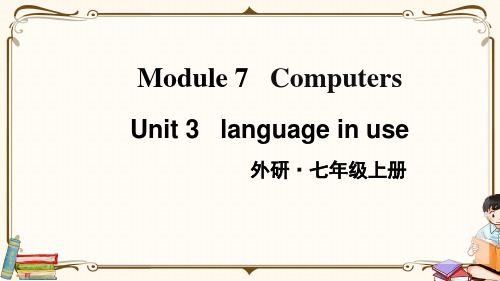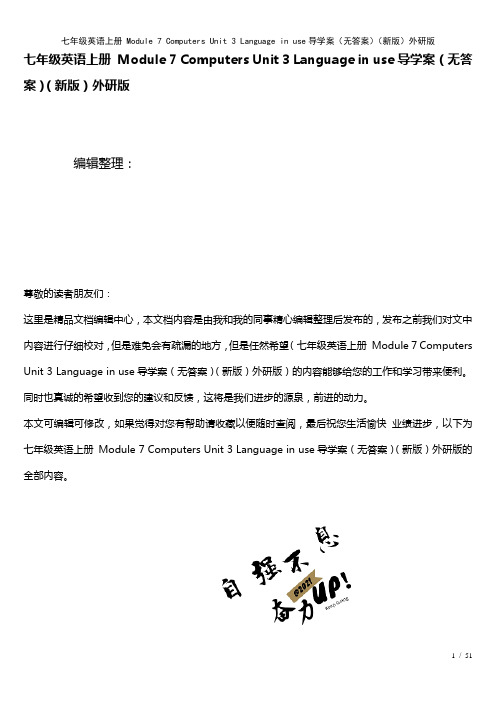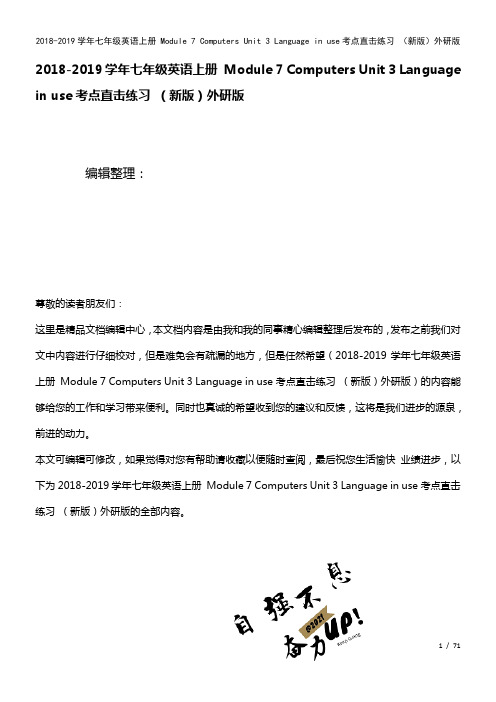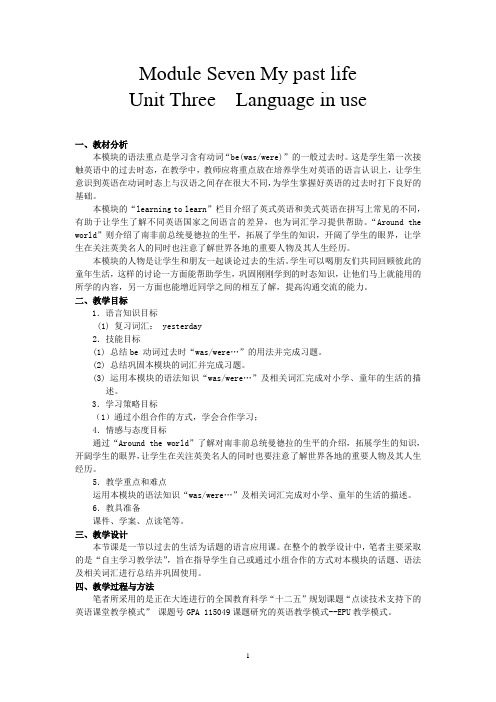七年级英语上册Module7ComputersUnit3Languageinuse教案(新版)外研版
2016年秋七年级英语上册 Module 7 Computers Unit 3 Language in use素材 (新版)外研版

Module 7 ComputersUnit 3 Language in use导入一话题导入特殊疑问词的用法who, who, who是谁, how, how, how怎样,when, when, when何时, where, where,where在哪里,whose, whose,whose是谁的, which, which,which哪一个,what, what, what是什么, what colour什么颜色,what time几点了, how old几岁了,how many是多少, how much多少钱,how about怎么样, how often 多频繁。
导入二语句导入T: What do you usually do on the computer?S1: I usually download music and listen to music.T: When do you download music?S1: On Sunday.T: OK. What about you?S2: …Now match the questions with the answers in Activity 1.Then ask and answer questions in pairs.Group work教材Activities 1-61.全班分为6个小组,完成Activities 1-2。
各小组成员完成题目之后,可以在组内进行讨论,最后统一组内的标准答案,由各小组长将各组答案写在黑板上。
2.学生先独立完成Activities 3-4, 然后小组内讨论统一答案,最后教师公布答案。
3.Activities 5-7的任务是要求学生做一个关于电脑的调查,为学生运用本模块的目标词汇和结构提供了真实的语境。
让学生根据教材提供的模式进行调查并记录内容,然后以小组为单位公布各小组的调查结果。
一般现在时的特殊疑问句Step 1观察及探究【观察】1.How do I write my homework on my computer?我怎样在电脑上写作业?2.How do I save the document?我怎样保存这个文件呢?3.What do I do next?我下一步该做什么?4.How do I print the document? 我怎样打印这个文件?【探究】1.特殊疑问句的构成:特殊疑问词+一般疑问句?2.特殊疑问词:what(询问事物) what time(询问时间,尤其是钟点)when(询问时间) how(询问方式)why(询问原因) who(询问人) where(询问地点)how many(提问数量) how often(提问频率)注意:特殊疑问句不能用“Yes”或“No”来回答,要根据它所询问的内容详细作答。
外研版七年级上册英语 Module 7 Unit 3 教学课件

(3)疑问形容词:
what time (询问具体时刻) how old (询问年龄)
what colour (询问颜色)
how far ( 询问距离)
how often (询问频率)
how many (询问可数名词的数量)
— Where do you save your homework? — I save my homework in a document.
— _______________________________. — _______________________________.
2 Complete the conversations. —Where do your grandparents live? —They live in Australia. 1 —_H_o_w__d_o__I________ save my document? —Click “save”and “OK”. 2 —_W__h_a_t_d_o_e_s_h__e_d_o____ with his computer? —He sends email.
• 谁在房间里唱歌? ( who 作主语) Who is singing in the room?
• 在你手里的是什么? ( what 作主语) What’s in your hand?
(2)若疑问词作其他成分,即对其他成分 提问,其语序是: 特殊疑问词+一般疑问句或特殊疑问词+ be/助动词/情态动词十主语+谓语十其他?
4 My mother doesn’t __l_ik_e___ computer games.
七年级英语上册Module7ComputersUnit3Languageinuse导学案(无答案)

七年级英语上册 Module 7 Computers Unit 3 Language in use 导学案(无答案)(新版)外研版1 /51七年级英语上册 Module 7 Computers Unit 3 Language in use 导学案(无答案)(新版)外研版编辑整理:尊敬的读者朋友们:这里是精品文档编辑中心,本文档内容是由我和我的同事精心编辑整理后发布的,发布之前我们对文中内容进行仔细校对,但是难免会有疏漏的地方,但是任然希望(七年级英语上册 Module 7 Computers Unit 3 Language in use 导学案(无答案)(新版)外研版)的内容能够给您的工作和学习带来便利。
同时也真诚的希望收到您的建议和反馈,这将是我们进步的源泉,前进的动力。
本文可编辑可修改,如果觉得对您有帮助请收藏以便随时查阅,最后祝您生活愉快 业绩进步,以下为七年级英语上册 Module 7 Computers Unit 3 Language in use 导学案(无答案)(新版)外研版的全部内容。
Module 7 Computers课题Module 7 ComputersUnit 3 Language in use主备人课型Revision课时11上课时间总课时数学习目标1、记住学过的词汇和重要句子.cinema; clothes; visit; holiday2、能够描述怎样使用电脑.3、一般现在时(当主语不是第三人称单数形式)的一般疑问句及其否定句。
教学过程备注课前自学一、Review the words。
1) I can see pictures and information on it。
(screen)2) I can use it to print my homework. (printer)3) I can type information into the computer。
初中英语外研版七年级上册《Module7 Computers Unit 3 Language in

How often do you go to the library? Once a week.一周一次
一、特别疑问句的构成:是由“疑问代词或疑问副 词 + 一样疑问句”构成的。 二、注意:特别疑问句不能用yes或no来回答, 而应 根据它所询问的内容直接作答。
1. —Where does Kate write her homework? —In the school library.
Complete the sentences with the correct form of the words in brackets.
1. Tony _d_o_e_s_n_’_t _s_e_e (not see) his uncle, but he __s_e_n_d_s (send) emails.
Then, save the document.
Click “save” and write a name for it, click “save” again.
Finally, print the document. Click “print” and “OK”.
1. How do I write my homework on the computer?
Where do you save your homework?
When do you use a computer?
How many emails do you write every week?
Who do you write to?
a).I write to my friends.
b).I save my homework in a document.
4. —W__h_o__d_o_y_o_u__w_r_it_e__ emails to? — I write emails to my friends.
2018秋七年级英语上册 Module 7 Computers Unit 3 Language in use同步

写作训练
一、根据文章内容,完成下列信息表。 Information Card
The place where Jack 1. _in__a__s_m_a_l_l city
lives The age of Jack The thing Jack downloads
2. _1_2_/_t_w_e_lv_e_ 3.some information
Module 7 Computers
Unit 3 Language in use
.
目录 contents
语法探究 巩固提升 写作训练 中考链接
目录 contents
语法探究
语法探究
行为动词的一般现在时(3) 在本模块,我们学习含行为动词的一般现在时 的特殊疑问句。 一、主语是非第三人称单数时,行为动词一般 现在时的特殊疑问句结构为: 特殊疑问词+ do +主语+谓语动词原形+其他?
语法探究
5. He usually watches TV on Saturday. _W__h_e_n____ __d_o_e_s____ he usually __w_a_t_c_h___ TV?
目录 contents
巩固提升
巩固提升
一、短语填空。 1. 保存你的作业_s_a_v_e_y_o__u_r homework 2. 写信给……_w_r_i_te__e_m_a_ils to… 3. 用电脑做某事_u_s_e_a__c_o_m_puter to do sth. 4. 为我们的假期做计划_p_la_n__f_o_r_o_ur holiday 5. 把……连接到……_c_o_n_n_e_c_t…__to…
语法探究
2. What does he play with now? 他现在玩什么? 3. Where does Wang Ling write her homework?王玲在哪儿写作业?
七年级英语上册 Module 7 Computers Unit 3 Language in use导学案(无答案)(新版)外研版

Module 7 Unit 3 Language in use课型:复习课【复习目标】1、熟练掌握学过的词汇。
2、能够描述怎样使用电脑。
3、一般现在时(当主语不是第三人称单数形式)的一般疑问句及其否定句。
4、一般现在时的特殊疑问句。
【课前准备】1、朗读学过的单词、短语、对话、课文等。
2、写出下列短语:使用电脑多少电子邮件发送邮件写作业检查时刻表买票上网制作旅行计划拜访网站获得信息使用笔记本电脑下载音乐玩电子游戏使用鼠标点击“新文件夹”在文件夹里点击“保存”打印作业【课堂活动】1、小组互查学过的词汇,并及时改正错误。
2、学生根据复习任务,自主复习,并记录疑难问题。
_______________________________________________________________________________ _________________________________________________________3、观察What do you usually do on your computer ?How many emails do you send ?Do you often go online ?Do you make travel plans on the Internet ?思考:在一般现在时中,一般疑问句和特殊疑问句有联系吗?说一说。
在一般现在时中经常使用的副词有哪些?4、做Activity 1 .(两人一组)5、做Activity 26、做Activity 37、做Activity 48、做Activity 5并根据所填内容造句。
阅读Around the world 。
9、学习成果展示A 就电脑使用方面,选择一些问题,制作一张表格问卷,选好采访对象。
B 采访同学,进行小组交流。
C 在小组交流的基础上,请几个同学在班上朗读。
当堂小节反馈:回想本课所学内容,你学到了哪些,还有哪些疑问?Unit 3 Language in use练习题I、单项选择。
外研版七年级英语上册《ontents Module 7 Computers Unit 3 Language in use》精品教案_1

“三环六步”课堂教学导学案年级:七年级科目:英语课题:module7Unit 3 Language in use一、学习目标:1、记住本模块全部单词(107页),复习本模块新的短语与句型。
2、一般过去时的用法:更加熟练正确地使用be的过去形式was、were;一般过去时be动词的句子结构。
二、课前预习:1、读熟单词并能记住本模块所有单词及重要句子。
2、用be动词的过去式was/ were填空。
1. I ______ born in Guangdong.2. He ______ ill yesterday.3. There ______ at school yesterday.4. The trees in the garden ______ short last year.5. There ______ an old woman in the house just now.6. ______ there tigers in the forest 20 years ago?我的疑问:_____________________________________________________________________ 三、合作探究解难展示观察下列句子:I was born in Quincy.My first teacher was Mrs Lane.I wasn’t bored in Quincy.Were you difficult in class too?No, I wasn’t.Where were you born?从例句可以看出,英语一般过去时中动词be的过去式为____, _____。
小组讨论一般过去时be 动词的句子结构:肯定句:______________________________________________________________________________ 否定句:______________________________________________________________________________一般疑问问及回答:_______________________________________________________________________________ _______________________________________________________________________________ 四、反馈拓展提升能力Task1: Read about Liu Yun. Ask and answer the questions. (Activity1)Task2: Complete the sentences with the correct form of be . (Activity3)Task3: Complete the sentences with the correct form of the words and expressions from the box. (Activity4)五、知识梳理形成结构Summary(课堂小结):What have you learned from this lesson?__________________________________________________________六、当堂训练检测过关I. 单项选择。
七年级英语上册Module7computersUnit3Languageinuse.学案无答案外研版

浙江省平湖市全塘中学七年级英语上册 Module 7 computers Unit 3 Language in use.学案(无答案)外研版[学习目标]1. To learn the new words(holiday).2. To use the simple pr esent tense to describe how to use computer to write homework. [学习反馈]A. 识记下列单词和词组1. 电影院2. 衣服(总称)3. 探望;参加4. 假日;节日5. 写信给*6. 制定;旅游计划7. 玩游戏B. 理解与运用a. 用所给词的适当形式填空。
1.Satoshi _________ ( play ) games, but he _________________ (not send ) emails. 2.Xiaomei _________ ( use ) her computer for work.3.Karl Heinz _________ ( make ) travel plans, but never _________ (buy ) tickets.b.按要求完成句子。
1. I usually use a computer on Sunday. ( 对划线部分提问 )_________ _________ you usually _________ a computer?2. Tom always play games on Sundays.( 变一般疑问句并作否定回答 )—_________ Tom _________ _________ games on Sundays? —_________, he _________.c. 选词填空。
connect use check1. _________ the printer to the computer.2. _________ your spelling of the words.*3. _________ the computer for my lessons.[巩固学习]a.单词拼写:1.Can you _________ ( 打印 ) these documents for me. I need them.2.You must _________ ( 发送 ) your homework when you finish it on the computer.3._________ ( 最后 ), you must save it.4.How many _________ ( 邮件 ) do you send?5.Thanks for giving me some _________ (信息).6.Sometimes my father _________( 买 ) tickets on the intern et.7.My mother _________ ( 使用 ) the computer to make travel plans.b.翻译:1. 我现在可以打开电脑吗? May I _________ _________ the computer now?2. 他经常晚上上网。
七年级英语上册Module7ComputersUnit3Languageinuse考点直击练习外研

2018-2019学年七年级英语上册Module 7 Computers Unit 3 Language in use考点直击练习(新版)外研版编辑整理:尊敬的读者朋友们:这里是精品文档编辑中心,本文档内容是由我和我的同事精心编辑整理后发布的,发布之前我们对文中内容进行仔细校对,但是难免会有疏漏的地方,但是任然希望(2018-2019学年七年级英语上册Module 7 Computers Unit 3 Language in use考点直击练习(新版)外研版)的内容能够给您的工作和学习带来便利。
同时也真诚的希望收到您的建议和反馈,这将是我们进步的源泉,前进的动力。
本文可编辑可修改,如果觉得对您有帮助请收藏以便随时查阅,最后祝您生活愉快业绩进步,以下为2018-2019学年七年级英语上册Module 7 Computers Unit 3 Language in use考点直击练习(新版)外研版的全部内容。
Module 7 ComputersUnit 3Language in use1. ① Do you have a nice (假日)?② We will have a long (暑假) .2. 我有时给我姐姐写电子邮件.Sometimes I an email my sister.3. ① Lisa born in Beijing in 1990.A. is B。
areC. wasD. were②他出生于2001年。
(翻译句子)_________________________________4。
①这个房间是你的房间的1.5倍大。
The room is times the size of yours。
②他将在北京待五天半.He will stay in Beijing for .模块专题聚焦Ⅰ。
单项选择1。
|武威中考|- does Bob usually go to work?—He usually rides his bike.A。
【配套K12]七年级英语上册 Module 7 Computers Unit 3 Language in use教学设计 (新版)外研版
![【配套K12]七年级英语上册 Module 7 Computers Unit 3 Language in use教学设计 (新版)外研版](https://img.taocdn.com/s3/m/6717c257866fb84ae45c8da7.png)
2. Complete the conversations in Activity 2 with a partner.
3.Check the answers.
Step 5 Language practice
Activity 3
2. Read through the information with the whole class, and talk something about them.
3. Show the video of the first computer.
1. Look at the picture and discuss what you can see.
b) I save my homework in a document.
c) I use my computer after school.
d) I write three or four emails.
2. Call back the answers from the whole class, check the answers.
任务教学法
教学设备
录音机;多媒体课件
教
学
过
程
教学步骤
设计意图
教师活动
学生活动
Step 1
Language practice
帮助学生学习语法,为任务的开展做好准备。
1. ______ do I write my homework on the computer?
我怎么在电脑上写我的作业?
2. ______ do I do next?
— He sends emails.
中学七年级英语上册 Module 7 Computers Unit 3 Language in us

2)Ican use it to print my homework. (printer)
3)Ican type information intotheputer. (keyboard).
4)Ican click it and open a new document. (mouse).What are they?
复习一般现在时疑问句句式。结合口头操练,加强学生对该语言点的感性认识,体会它们的意义和用法。并引导学生归纳总结语法概念,
1. Read through the example sentences in the box with the whole class.
2. Askthe students to repeat the sentences in the box.
2. plete the conversations in Activity 2 with a partner.
3.Check the answers.
Step 4 Language practice
Activity 3
通过练习,加以巩固一般现在时的否定句的用法。
1.Read throughthesentenceswith the whole class.
教学方法
任务教学法
教学设备
录音机;多媒体课件
教
学
过
程
教学步骤
设计意图
教师活动
学生活动
Step 1
Warming
-up
对本模块所学的有关电脑的词汇进行复习,在复习过程中调动学生的学习积极性。强化对词汇及一些动宾搭配的理解、记忆和掌握,为任务的开展做好词汇的储备。
姜堰市师院附中七年级英语上册Module7ComputersUnit3Languageinuse作

Module 7 Unit 3Ⅰ. 根据句意从方框中选出恰当的单词填空,有的需要变换形式。
email, where, plan, like, talk1. How many does your sister write every week?2. I to my friends in the playground.3. Jack watching TV in the evening.4. Let’s for our summer holiday, Lucy.5. do I write my name?Ⅱ. 将所给单词连成完整、正确的句子(单词不得重复使用,句末标点符号已给出)。
1. how, open, new, this, document, you, do?2. Jim, see, cousin, doesn’t, his.3. use, Internet, the, we, we, don’t, but, games,play.4. when, your, do, homework, you, do?5. computer, on, turn, please, your, first.6. click, now, “save”, “OK”, and.7. the, buys, she, ticket, Internet, on, a.Ⅲ. 阅读Module 7的Around the world部分,然后看图并判断下列表述的正(T)误(F)。
ENIAC( ) 1. This is the first computer in the world.( ) 2. It was born in 1945 in America.( ) 3. It’s the same size as a classroom.( ) 4. It is very heavy.( ) 5. It is about 3, 000 kilos.Module 7 Unit 3参考答案Ⅰ. 1. emails 2. talk 3. likes 4. plan 5. Where Ⅱ. 1. How do you open this new document2. Jim doesn’t see his cousin3. We use the Internet but we don’t play games4. When do you do your homework5. Please turn on your computer first6. Click “save” and “OK” now7. She buys a ticket on the InternetⅢ. 1-5 TFFTFUnit 6 I’m watching TV.Period 1 Section A 1a-2d【课型】听说课学习目标1.掌握现在进行时态及一些表示具体动作的词组搭配,如:doing homework,watching TV,eating dinner等。
Module7Unit3Languageinuse课件英语七年级上册

People use it to make maps. It also helps countries see where they may
find oil(石油) 2 gold(黄金).
( C )1.A.in ( B )2.A.so
B.at B.or
C.of C.but
( A )3.A.use ( A )4.A.send ( B )5.A.three ( A )6.A.to watch ( B )7.A.where
because
What
watch also
world our
family
with play happy
三、完形填空。
主题:替约书亚 词数: 难度: 体裁:记叙文
上学的机器人 170 ★★★★☆
正确率: ____ /10
Joshua is a 7-year-old German boy. He is too ill to go to
C
( A )7.A.well C.quickly
( B )8.A.home C.life
B.fast D.happily B.school D.lesson
A local council(委员会) in Berlin 9 the robot for him. Sometimes,
children cannot go to classes for all kinds of reasons.So such 10 help
her homework?
补充:对于特殊疑问句,需要注意两点: ◆特殊疑问句的语序与一般疑问句是一致的; ◆要根据所提问的内容选择特殊疑问词,特殊疑问词总是放在句首。
课堂检测
一、 单项填空。
外研版七年级英语上册Module7ComputersUnit3Languageinuse第1课时省优获奖教案

Unit 3 Language in useⅠ.Teaching modelFormal and interactive practiceⅡ.Teaching aims1.To review and check the words learned in this module2.To summarize the usage of Wh-questionsⅢ.Teaching aidsTape recorder,videoⅣ.Teaching Steps第一课时(Activity 1-Activity 3)Step 1:RevisionShow some pictures to review the words and expressions about computer in Unit 1 and Unit 2. Step 2:Language practice1.Read the sentences and fill in the blanks with the proper words.(1)________ do I write my homework on the computer?(2)________do I do next?(3)________ do I write the name?2.Then check the answers with partners.Keys:(1)How (2)What (3)WhereStep 3:Practice 11.Revise the usage of Wh-questions in present simple.2.Ask the students to read the questions and answers in Activity 1.3.Have the students match the questions with the answers with partners.4.Call back the answers from the whole class and then check the answers.Keys:(1)b (2)c (3)d (4)a5.Now work in pairs.6.Ask and answer the questions.Step 4:Practice 21.Ask the students to read through the example conversation in Activity 2.2.Have them complete the conversations in Activity 2 with their partners.3.Call back the answers from the whole class and then check the answers.Keys:1.How do I2.What does he do3.When does she use4.Who do you write5.How many emails do they send4.Let the students read the conversations aloud.5.Read through the sentences in Activity 3 with the whole class.(1)Tony ________(not see) his uncle,but he________(send) emails.(2)We________(use) the Internet on our computer,but we ________(not play) games.(3)Daming ________(not use) a computer to do his homework,but he uses it to________(play) music.(4)She ________(make) travel plans on the Internet,but she ________(not buy) tickets.(5)We ________(not have) a computer at home,but we ________(use) the computer at school. 6.Ask the students to complete the sentences with the correct form of the words in brackets. 7.Call back the answers from the whole class,then check the answers.Keys:(1)doesn't see,sends(2)use,don't play(3)doesn't use,play(4)makes,doesn't buy(5)don't have,use8.Read the sentences together loudly.Step 5:Homework1.Revise all the key points in this module.2.Finish the workbook.Blackboard DesignUnit 3 Language in use(Activity 1-Activity 3)1.How do I write my homework on the computer?2.What do I do next?3.Where do I write the name?Unit 3 Language in use Ⅰ.Teaching modelRevision and applicationⅡ.Teaching aims1.To learn to describe the school with “there be” structure and prepositional phrases indicating positions in space.2.To revise all the key points in this module.Ⅲ.Teaching aidsTape recorder,PPT,handout,multimediaⅣ.Teaching steps第一课时(Activity 1-Activity 2)Step 1:Warming upShow some pictures to review the text in Unit 1 and Unit 2.Step 2:Language practice1.Read the sentences and fill in the blanks with the proper words.(1)There ________ thirty students in my class.(2)— ________ there computers on ________ desk?— No,there ________.(3)—________ there a map ________ the world?—No,there ________.(4)________ ________ students are there in your class?(5)The library is ________ ________ ________ ________ the playground.2.Check the answers.Keys:(1)are (2)Are;everyone's;aren't (3)Is;of;isn't (4)How many (5)on the left of Step 3:Practice 11.Revise the usage of “there be ”.2.Have students look at and read the questions in Activity 1.(1)How many classrooms are there in your school?(2)Is there a library in your school?(3)Are there any science labs?(4)How many students are there in your class?(5)How many are boys and how many are girls?(6)Are there any computers in your classroom?(7)Is there a blackboard in your classroom?(8)Where is the teacher's desk?3.Work in pairs.Ask and answer the questions about your school.4.Ask some pairs to answer the questions.Step 4:Practice 21.Revise behind,in front of,on the right/left of,between…and…,next to.2.Have the students look at the picture and read the questions in Activity 2.(1)Where is the office building?(2)Where is the dining hall?(3)Where is the playground?(4)Where is the sports hall?(5)Where is the science building?3.Ask them to answer the questions.4.Check the answers.Keys:(1)It's on the right of the gate/in front of the classroom building.(2)It's behind the science building.(3)It's between the dining hall and the library/between the science building and the classroom building.(4)It's on the left of the gate/in front of the science building.(5)It's between the dining hall and the sports hall.5.Let students read the passage in Activity 2 and then complete it.This is a map of our school.(1)________ the gate is the office building and behind this is the (2)________.(3)________ the classroom building is the library.The science building is (4)________ the dining hall and the (5)________.And behind the dining hall,the playground and the library there are (6)________.6.Ask several students to share their answers and then check them.Keys:(1)On the right of (2)playground (3)Behind (4)between (5)sports hall (6)many trees 7.Have the students read the passage aloud.Step 5:Homework1.Revise all the key points in this module.2.Finish the workbook.Blackboard DesignUnit 3 Language in use(Activity 1-Activity 2)1.There are thirty students in my class.2.—Are there computers on everyone's desk?—No,there aren't.3.—Is there a map of the world?—No,there isn't.4.How many students are there in your class?5.The library is on the left of the playground.。
外研版七年级英语上册《ontents Module 7 Computers Unit 3 Language in use》精品教案_5

Module Seven My past lifeUnit Three Language in use一、教材分析本模块的语法重点是学习含有动词“be(was/were)”的一般过去时。
这是学生第一次接触英语中的过去时态,在教学中,教师应将重点放在培养学生对英语的语言认识上,让学生意识到英语在动词时态上与汉语之间存在很大不同,为学生掌握好英语的过去时打下良好的基础。
本模块的“learning to learn”栏目介绍了英式英语和美式英语在拼写上常见的不同,有助于让学生了解不同英语国家之间语言的差异,也为词汇学习提供帮助。
“Around the world”则介绍了南非前总统曼德拉的生平,拓展了学生的知识,开阔了学生的眼界,让学生在关注英美名人的同时也注意了解世界各地的重要人物及其人生经历。
本模块的人物是让学生和朋友一起谈论过去的生活。
学生可以喝朋友们共同回顾彼此的童年生活,这样的讨论一方面能帮助学生,巩固刚刚学到的时态知识,让他们马上就能用的所学的内容,另一方面也能增近同学之间的相互了解,提高沟通交流的能力。
二、教学目标1.语言知识目标(1) 复习词汇: yesterday2.技能目标(1) 总结be 动词过去时“was/were…”的用法并完成习题。
(2) 总结巩固本模块的词汇并完成习题。
(3) 运用本模块的语法知识“was/were…”及相关词汇完成对小学、童年的生活的描述。
3.学习策略目标(1)通过小组合作的方式,学会合作学习;4.情感与态度目标通过“Around the world”了解对南非前总统曼德拉的生平的介绍,拓展学生的知识,开阔学生的眼界,让学生在关注英美名人的同时也要注意了解世界各地的重要人物及其人生经历。
5.教学重点和难点运用本模块的语法知识“was/were…”及相关词汇完成对小学、童年的生活的描述。
6.教具准备课件、学案、点读笔等。
三、教学设计本节课是一节以过去的生活为话题的语言应用课。
- 1、下载文档前请自行甄别文档内容的完整性,平台不提供额外的编辑、内容补充、找答案等附加服务。
- 2、"仅部分预览"的文档,不可在线预览部分如存在完整性等问题,可反馈申请退款(可完整预览的文档不适用该条件!)。
- 3、如文档侵犯您的权益,请联系客服反馈,我们会尽快为您处理(人工客服工作时间:9:00-18:30)。
T:check the answer
S:学生回答问题
Step2
Module task: Doing a questionnaire about computers.
Do you have a computer at home?
When do you use a computer?
Step3
Discussion
T:What are the advantages and disadvantages of using a computer?
S:…
Writing
Write down your opinion of the advantages and disadvantages of using a computer.
教学重点
复习巩固一般现在时的用法,尤其是本模块所学的一般现在时特殊疑问形式
复习巩固本模块所学的电脑词汇及一些动宾搭配的使用。
教学难点
较熟练地运用本模块中所学的词汇和句型,区别应用助动词do, does
教学过程
环节
师生活动
反馈调整Байду номын сангаас
Step1
Class begins. Good morning boys and girls.
板书设计
Unit 3 Language in use
1) share --- with---
2) on the Internet
3) go on the Internet to do sth.
4) There is a computer in my home.
We have a computer at home.
5) sometimes/sometime/some times/some time
课后反思
Today let’s come to u3, first think about how do you do your homework on the computer?
S:…
T: show the pictures to review u1
T: Discuss the question in pairs. What can we use a computer for?
Step4
Do some exercises
Homework.
1.Review the grammar we have learned today.
plete your composition about the advantages and disadvantages of computer.
What do you usually do on your computer?
How many emails do you send every week?
Do you often go online?
Do you make travel plans on the Internet?
What games do you play?
Unit 3 Language in use
教学目标
1.听:能听懂所学的有关电脑方面的词汇;听懂一般现在时的特殊疑问句
2.说:能就电脑的使用进行简单的问答;能运用一般现在时特殊疑问形式进行问答
3.读:能读懂简单的特殊疑问句及其回答
4.写:能结合本模块所学的语言知识,准确运用所学句型结构写出相关的表达
